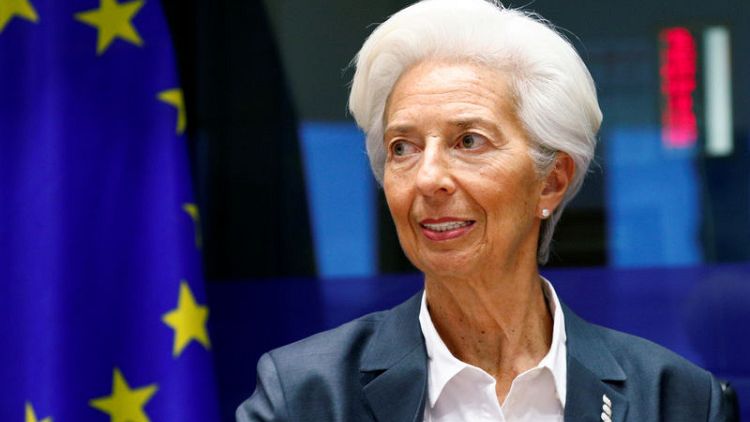FRANKFURT (Reuters) - The European Central Bank will conduct an overarching review of its policy strategy soon, looking at everything from the definition of its inflation target to fighting climate change.
The following looks at the key issues in the upcoming review, discussing possible outcomes.
WHAT IS THE REVIEW?
The review will be a broad look at how the ECB operates, touching on everything from its inflation target to what it can do to fight climate change. While ECB President Christine Lagarde has declined to specify its scope, she said that "every stone will have to be turned and every option will have to be examined".
WHY IS IT NECESSARY?
High inflation was the main fear when the ECB was set up just over 20 years ago but now the opposite is the case.
The ECB has missed its target -- price growth of below but close to 2% -- since 2013 and the euro zone at one stage flirted with deflation, like kryptonite for indebted governments and companies because it increases the real value of what they owe.
Trying to get prices rising again, the bank has exhausted nearly all of its conventional tools and now relies on largely untested measures like negative interest rates and large-scale asset purchases to provide accommodation.
The population is ageing rapidly and productivity growth is weak so the neutral interest rate, which neither slows nor stimulates the economy, has fallen to zero or even below zero.
COULD THE ECB GIVE UP ON INFLATION TARGETING?
No, the responsibility to maintain "price stability" is enshrined in the European Union Treaty. The ECB has flexibility in defining price stability, however, and changed its definition following its only previous such review in 2003. Lagarde has said that the target "might be different" once the coming review is finished.
HOW COULD THE INFLATION TARGET CHANGE?
Some are advocating an outright cut but most appear to reject the idea, fearing credibility damage if a hard-to-reach target is simply abandoned.
The discussion is likely to focus on whether to target a single number, a range or a band, and what sort of flexibility the ECB should have in case of a miss. It is also likely to discuss the merits of overshooting after a lengthy period of low inflation.
The ECB also needs to provide a clear definition of what symmetry around the target actually means.
The review may also consider targeting a different measure of price growth, as some argue that headline inflation does not sufficiently account for property and rent prices.
But as Isabel Schnabel, Germany's next ECB board representative said, changes are not likely to be big.
WHEN IS THE REVIEW STARTING
Lagarde said it could start soon but don't expect an imminent announcement. Two new board members will join on Jan. 1 and the scope of the review is likely to be decided once Lagarde redistributes board portfolios early next year.
HOW LONG WILL IT TAKE
No timeline has been given but international experience suggests at least a year. The U.S. Federal Reserve announced a review of its "strategy, tools, and communication" in November 2018 and expects to publish its findings in the first half of 2020. ECB watchers say that the ECB's own review is unlikely to be any quicker.
WHAT WAS THE MAIN OUTCOME OF THE 2003 REVIEW?
The ECB changed its inflation target by adding "but close" to the previous formulation, which was for annual price growth of below 2%.
WILL CLIMATE CHANGE BE FACTORED IN?
Lagarde has called climate issues "mission critical" but said they will not be a core part of the review. The focus of the ECB will remain price stability so any climate goal is likely to be secondary.
(Reporting by Balazs Koranyi; Editing by Catherine Evans)



